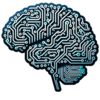| Part of a series on |
| Artificial intelligence |
|---|
AlphaGo Zero is a version of DeepMind's Go software AlphaGo. AlphaGo's team published an article in Nature in October 2017 introducing AlphaGo Zero, a version created without using data from human games, and stronger than any previous version.[1] By playing games against itself, AlphaGo Zero: surpassed the strength of AlphaGo Lee in three days by winning 100 games to 0; reached the level of AlphaGo Master in 21 days; and exceeded all previous versions in 40 days.[2]
Training artificial intelligence (AI) without datasets derived from human experts has significant implications for the development of AI with superhuman skills, as expert data is "often expensive, unreliable, or simply unavailable."[3] Demis Hassabis, the co-founder and CEO of DeepMind, said that AlphaGo Zero was so powerful because it was "no longer constrained by the limits of human knowledge".[4] Furthermore, AlphaGo Zero performed better than standard deep reinforcement learning models (such as Deep Q-Network implementations[5]) due to its integration of Monte Carlo tree search. David Silver, one of the first authors of DeepMind's papers published in Nature on AlphaGo, said that it is possible to have generalized AI algorithms by removing the need to learn from humans.[6]
Google later developed AlphaZero, a generalized version of AlphaGo Zero that could play chess and Shōgi in addition to Go.[7] In December 2017, AlphaZero beat the 3-day version of AlphaGo Zero by winning 60 games to 40, and with 8 hours of training it outperformed AlphaGo Lee on an Elo scale. AlphaZero also defeated a top chess program (Stockfish) and a top Shōgi program (Elmo).[8][9]
- ^ Silver, David; Schrittwieser, Julian; Simonyan, Karen; Antonoglou, Ioannis; Huang, Aja; Guez, Arthur; Hubert, Thomas; Baker, Lucas; Lai, Matthew; Bolton, Adrian; Chen, Yutian; Lillicrap, Timothy; Fan, Hui; Sifre, Laurent; Driessche, George van den; Graepel, Thore; Hassabis, Demis (19 October 2017). "Mastering the game of Go without human knowledge" (PDF). Nature. 550 (7676): 354–359. Bibcode:2017Natur.550..354S. doi:10.1038/nature24270. ISSN 0028-0836. PMID 29052630. S2CID 205261034. Archived (PDF) from the original on 18 July 2018. Retrieved 2 September 2019.

- ^ Hassabis, Demis; Siver, David (18 October 2017). "AlphaGo Zero: Learning from scratch". DeepMind official website. Archived from the original on 19 October 2017. Retrieved 19 October 2017.
- ^ "Google's New AlphaGo Breakthrough Could Take Algorithms Where No Humans Have Gone". Yahoo! Finance. 19 October 2017. Archived from the original on 19 October 2017. Retrieved 19 October 2017.
- ^ Knapton, Sarah (18 October 2017). "AlphaGo Zero: Google DeepMind supercomputer learns 3,000 years of human knowledge in 40 days". The Telegraph. Archived from the original on 19 October 2017. Retrieved 19 October 2017.
- ^ mnj12 (7 July 2021), mnj12/chessDeepLearning, retrieved 7 July 2021
{{citation}}: CS1 maint: numeric names: authors list (link) - ^ "DeepMind AlphaGo Zero learns on its own without meatbag intervention". ZDNet. 19 October 2017. Archived from the original on 20 October 2017. Retrieved 20 October 2017.
- ^ https://www.idi.ntnu.no/emner/it3105/materials/neural/silver-2017b.pdf
- ^ Silver, David; Hubert, Thomas; Schrittwieser, Julian; Antonoglou, Ioannis; Lai, Matthew; Guez, Arthur; Lanctot, Marc; Sifre, Laurent; Kumaran, Dharshan; Graepel, Thore; Lillicrap, Timothy; Simonyan, Karen; Hassabis, Demis (5 December 2017). "Mastering Chess and Shogi by Self-Play with a General Reinforcement Learning Algorithm". arXiv:1712.01815 [cs.AI].
- ^ Knapton, Sarah; Watson, Leon (6 December 2017). "Entire human chess knowledge learned and surpassed by DeepMind's AlphaZero in four hours". The Telegraph. Archived from the original on 2 December 2020. Retrieved 5 April 2018.
